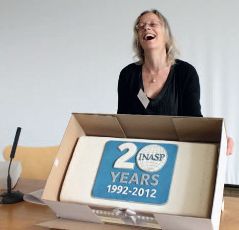Connectivity improves, but finding content can be hard
Julie Clayton reports from the INASP 20th Anniversary Symposium about the developments and challenges in providing information access in developing-world regions

Internet connectivity to Africa and other developing-world regions is improving at a dramatic pace, but what good is connectivity if people are not equipped to make use of it?
This was among key questions raised at the 20th Anniversary Symposium of INASP, which was held in Oxford in June. Speakers from around the world highlighted many of the challenges still facing users of the internet, as well as new developments that promise to address these.
As an international operation, INASP (International Network for the Availability of Scientific Publications) is striving to enable researchers, educators and students in developing-world regions to access the full benefits of online digital media. ‘We’re trying to build a new vibrant community that can take advantage of this new environment,’ said John Wood, chair of INASP’s Board of Trustees, in his opening address.
Over the past decade, the laying of undersea fibre-optic cables means that Africa, Latin America, and other regions now have a cheaper service and greater bandwidth than was possible from satellite links. Cables such as the Eastern Africa Submarine Cable System (EASSy) and the West African Cable System (WACS) have helped to raise capacity for internet traffic to and from Africa to 30 terabytes per second. And yet Africa’s internet use remains low, according to Alan Jackson of the not-for-profit IT development organisation Aptivate. He cited Africa’s share of internet use (termed internet penetration) as only around 13 per cent, with 140 million internet users compared to Europe’s 500 million.
Jackson lamented that internet connectivity may be reaching the shores of Africa, but it is not getting far inland owing to lack of infrastructure and coordination among local internet service providers. Consequently, bandwidth to end users remains low. The average bandwidth for Africans is only 40 kilobytes per second (kbps), according to a capacity-testing project known as PingER (Ping End-to-end Reporting). On the plus side, bandwidth in Africa has grown three-fold in the past few years, but this is not sufficient. The size of web pages has grown around seven-fold since 2003. Now, for example, that a typical web page from the University of Oxford, at 40 kbps, may take around 50 seconds to download. Jackson pointed to the European Union-funded Connect Africa project as one of several initiatives that aim to improve the situation by providing bandwidth directly to African universities.
Latin America faces similar difficulties. ‘We are struggling on how to get connectivity inside countries where coverage is not as good as we would like it to be,’ noted Florencio Uteras, executive director of RedCLARA (Latin American Cooperation of Advanced Networks).
RedCLARA is building connectivity to and within Latin America, enabling academic networks to thrive. Through the hosting of video conferencing, including participation in EU Virtual Information Days, for example, the project is boosting awareness about research funding and the grant application process, according to Uteras. As a result, participation by Latin America in European-funded research projects rose by 40 per cent from 2008 to 2009. Uteras stressed that improving links between Latin American researchers is enabling them to tackle ‘meaningful regional problems’ such as forecasting natural disasters such as earthquakes, volcanoes and floods, and the development of new treatments for infectious diseases.

A panel discussion featured (L-R) Alan Jackson, Nnena Nwakanma, Kamran Naim and Florencio Utreras
Besides connectivity issues, researchers and students in developing regions face other obstacles in trying to access and share scientific information. Even though many publishers now permit some degree of open access, users are hampered by an inability to find and retrieve publications.
According to Kamran Naim, programme lead at GLORIAD (Global Ring Network for Advanced Applications Development), there is a ‘plethora of subscribed or free resources’ now available to researchers online. In one study, 80 per cent of the top 400 academic journals are available to African researchers on the internet, compared to 90 per cent availability in Europe, so ‘availability is not a problem’, he said.
Rather, the problem is in the ability to locate and download articles. This is due to poor understanding of what resources are available, the fragmentation of research resources, and the complexity of web interfaces. Many research databases, for example, require users to have institutional passwords and to cope with complicated search tools. Similarly, while many research institutions have created their own online repositories, researchers often have to navigate each one independently. The result is ‘poor usability’ of internet resources, according to Naim, with the consequence that ‘users get disenfranchised and fall back in their research’.
GLORIAD is pioneering the development of simpler and broader web-based tools for accessing research information. These include the Iraqi Virtual Science Library, which provides users at a pre-defined list of Iraqi research institutions with access to many different international publications databases. This in turn may have been one of the reasons behind a marked and steady increase in the output of scientific publications from Iraq, Naim noted.

Rose Oronje
Lack of awareness about available resources, and inadequate search skills are also a barrier for many in African universities. ‘Researchers and students often struggle to conduct effective internet searches or to evaluate the quality of information. It’s really easy to find students quoting information they find from Wikipedia in their academic publications,’ said Rose Oronje, communications specialist at the African Institute for Development Policy.
She noted that librarians, in particular, can play a key role in providing training on internet search skills, not just for students and researchers on arrival, but on an on-going basis.
This capacity building for users remains critical. As John Wood commented, ‘we need people who can operate in this space. Without people who can understand it, there’s no hope’.
-
INASP 20th Anniversary Symposium: symposium2012.inasp.info
-
Aptivate: www.aptivate.org/home
-
PingER project: www-iepm.slac.stanford.edu/pinger
-
GLORIAD: www.gloriad.org
-
Africa Connect: www.africaconnect.eu
-
RedCLARA: www.redclara.net
-
Iraqi Virtual Science Library: www.ivsl.org






